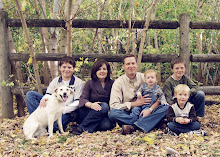Here are some things we love about you:
J--Just cereal. Joey has somehow managed to survive on a very limited diet of cereal and milk.
 O--Oh, and did I mention Olives? He has a very distinguished palate. And he is also particular about the actual process of eating his olives.
O--Oh, and did I mention Olives? He has a very distinguished palate. And he is also particular about the actual process of eating his olives.
 S--Joey is VERY STUBBORN! I can not say this enough. Yes he is...Yes he is...I said he is...is, too... Is, too...Really...Yeah he is! (I have no idea where he got this particular personality trait.)
S--Joey is VERY STUBBORN! I can not say this enough. Yes he is...Yes he is...I said he is...is, too... Is, too...Really...Yeah he is! (I have no idea where he got this particular personality trait.) E--Entertainer. Joey loves to be the center of attention and make everyone laugh. He usually does this by repeating inappropriate words he has heard from T.V. (not his parents) Most of the time it is in front of Grandparents or at church or somewhere that makes us cringe with horror. But he loves to see us squirm.
E--Entertainer. Joey loves to be the center of attention and make everyone laugh. He usually does this by repeating inappropriate words he has heard from T.V. (not his parents) Most of the time it is in front of Grandparents or at church or somewhere that makes us cringe with horror. But he loves to see us squirm. P--Peek-a-Boo. Joey is basically the best peek-a-boo player ever. I dare anyone to attempt to best his skills. He can compete with the masters. Not only does he have the motions and words down, but his endurance is unmatched. Long after everyone else has surrendered, he is still able to bring it.
P--Peek-a-Boo. Joey is basically the best peek-a-boo player ever. I dare anyone to attempt to best his skills. He can compete with the masters. Not only does he have the motions and words down, but his endurance is unmatched. Long after everyone else has surrendered, he is still able to bring it.  H--Helper. Joey is always looking for ways to help. He especially likes to sweep and order the dog around. Sometimes he helps by cleaning out a cupboard or emptying out a box of cereal. What would I do without him?
H--Helper. Joey is always looking for ways to help. He especially likes to sweep and order the dog around. Sometimes he helps by cleaning out a cupboard or emptying out a box of cereal. What would I do without him?

 Sledding is a whole lot of this...
Sledding is a whole lot of this...




.jpg) Apparently, Mandy and Richard had quite an exciting night, including flying down Parley's Canyon at break-neck speeds, running red lights, and barely making it to the hospital in time to deliver this little angel. That will be a fun story to tell her some day, but for now, make sure she gets lots of kisses and love. You don't want to waste a perfectly good baby...
Apparently, Mandy and Richard had quite an exciting night, including flying down Parley's Canyon at break-neck speeds, running red lights, and barely making it to the hospital in time to deliver this little angel. That will be a fun story to tell her some day, but for now, make sure she gets lots of kisses and love. You don't want to waste a perfectly good baby....jpg)
 The obligatory "Sit in front of the Christmas Tree in your new Pajamas" photo.
The obligatory "Sit in front of the Christmas Tree in your new Pajamas" photo.
 Mmm...Christmas Breakfast: Egg-nog French Toast.
Mmm...Christmas Breakfast: Egg-nog French Toast. Elmo Live,
Elmo Live, Spike the Dinosaur ("You're sure you want to ask Santa for that? Really?")
Spike the Dinosaur ("You're sure you want to ask Santa for that? Really?") Some posters from their favorite movies to add a little spice to our basement...
Some posters from their favorite movies to add a little spice to our basement...
 Here we have Joey telling Dad to take the cast off.
Here we have Joey telling Dad to take the cast off.
 Now he's telling me to take it off.
Now he's telling me to take it off.
 Fine, I'll have to do it myself!
Fine, I'll have to do it myself!


